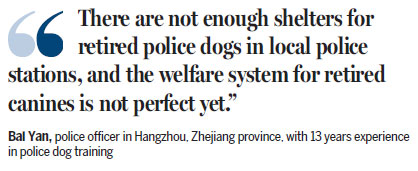Retired police dogs still being of service
By Shi Xiaofeng in Hangzhou | China Daily | Updated: 2017-10-02 07:44
Officer dedicates his time to caring for canines
"Xiaolong, jump!"
"Xiaolong, rescue!"
Xiaolong, a 10-year-old retired police dog, reacted to the verbal instructions and hand gestures given by his handler, Bai Yan, on the TV show Brilliant Chinese.
| Bai Yan, a policeman in Hangzhou, Zhejiang province, performs a daily health check on Gongzi. Photos Provided to China Daily |
| Clockwise from top left: Gongzi, 13.5 years old and diagnosed with a skin tumor at the end of 2013, receives treatment at the retired canines' home; Bai takes Gongzi back to the retired canines' home after a walk; A'bu, in active service in Bai's squad, jumps through a hanging tire; Xingzai, age 12, suffers from bone disease and ommunicates with 13-year-old Helu by eye contact. Photos Provided to China Daily |

Bai continuously encouraged his old "comrade" with words like "well done" and "good boy" as Xiaolong gnawed a rope with his teeth during a hostage rescue mission.
"It was his favorite mission during his service in the unit. He could bite through the rope in only five seconds! Now, it takes longer but we play the game just for fun," Bai said with a sigh.
Xiaolong, a Great Dane and Malinois cross, was adopted by Bai and was trained and worked in the police dog unit for 8 years.
He is spending his remaining years with 15 other peers in a retired canine home founded by Bai in Hangzhou.
"Nursing retired police dogs is different from taking care of seniors," said Bai, 55, a policeman in Hangzhou, Zhejiang province. "It is necessary to play with them in order to maintain their physical and mental health."
Back in 2004, Bai attempted to organize the first canine unit for the local police station because of the great help dogs can offer.
Twenty-six police dogs, including German shepherds, Malinois and Labradors, were recruited in Bai's brigade through a strict screening process.
The canine force was used in a wide variety of duties including patrol, search and detecting illicit substances.
With more than 3,000 missions on average, these well-trained police dogs were regarded as heroes by Bai and his colleagues.
"One time we tracked suspects with a dog on the highway. The suspects noticed us and sent three of their accomplices to attack us," said Bai. "But they didn't know we had canines in the van. The canines pounced on them and subdued them soon after I sent the order."
Kaxi, a German shepherd, was honored as a "meritorious canine" by the department of public security of Zhejiang province in 2009 for helping crack over 200 cases and arrest more than 80 suspects.
Police dogs retire from the squad after eight to 10 years of service.
"I found my brave canines were staggering when they ran in 2009, and I knew at that time that my buddies were getting old," said Bai.
The public security departments in China help retired police dogs by arranging for them to spend their later lives in the units they served, or letting them be adopted by their handlers. Caring civilians can also apply to adopt the retired canines.
"There are not enough shelters for retired police dogs in local police stations, and the welfare system for retired canines is not perfect yet," Bai said.
"The best choice for a retired dog is being adopted by his handler. However, there are few handlers in our brigade and their apartments are usually too small to shelter the big canine. Only six dogs were adopted after retirement while the others had no place to go," added Bai.
"I once sent Jack, one of the retired canines in my unit, to a local friend who promised him a good life in 2009," said Bai. "However, when I came to visit Jack two months later, I found he was chained, lying on the ground with leftovers on his side."
"They are my comrades who have worked with me and kept me company for more than eight years, they are my friends and family. I want to give them a dignified retirement," said Bai.
Bai took Jack back and started to contemplate the later years of the retired canines in his squad.
He built the home for retired canines at his own expense with the help of colleagues and friends in early 2010 in Yinhu neighborhood of Hangzhou, defining it as "home for retired canines".
Not only new kennels but also equipment for training courses are built for the canines to secure them a comfortable retirement.
"I get up at 4 am every morning and go to the canines' home to say hello to them. Then I check them and feed them. After that, we play games," said Bai. "They are old now, so every course or game we do is conducted much slower."
Sixteen retired police dogs, including Xiaolong and Jack, are spending their later lives in the retired canines' home.
Gongzi, at age 13.5 the oldest canine in the home, was diagnosed with a skin tumor months ago and the disease has worsened over time. Bai, disregarding his friends' suggestions to end the dogs' life with euthanasia, studied medical books and treated Gongzi with the methods and prescriptions he obtained.
"I raised Gongzi and treat him like my own boy. I am really happy that Gongzi is still there," Bai smiled. "Doudou, one of the retired canines, has an eye disease. I wash his eye and massage him every day, and take him for walks."
Four of the retired canines brought to the home have died in the last seven years, and were then buried under the tree in the courtyard with their name tags hanging on the tombstones. Bai visits these departed "friends" on memorial days.
"A dog is different from other animals. It knows you and can feel your emotions. They are my comrades at work and my family in my life. They will cheer me up with various funny gestures when I am upset," Bai said, laughing.
"My canines know that I never smoke or drink. Whenever strangers offer me a cigarette, they will growl to warn them to stop. If a terrorist is about to launch an attack on me, they will protect me with their lives," Bai said with pride.
"The police dogs need companionship, especially after retirement. They need you to play with them to make them feel safe. Ten years with them is not a long period in my life, but to them, it is their whole lifetime," Bai said.
Bai finances the canines' home on his own and has refused material and assistance from the public and charities.
"I haven't calculated the money I've spent on them because I don't care how much it costs," said Bai. "What I really want is to raise people's concern for retired police dogs and let the canines do something good for society even as they get old."
Cheng Si contributed to this story.
shixiaofeng@chinadaily.com.cn
(China Daily 10/02/2017 page5)


























